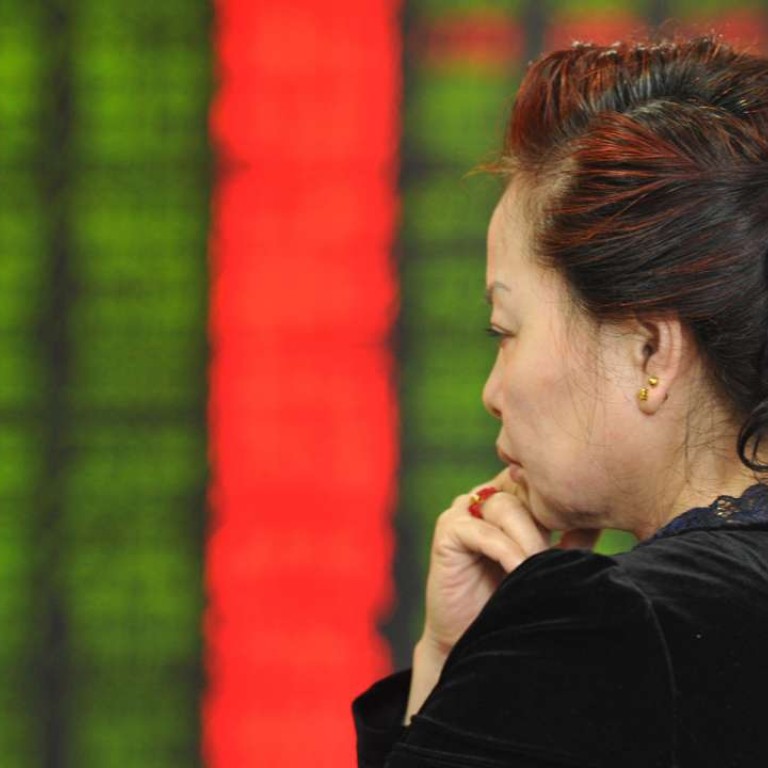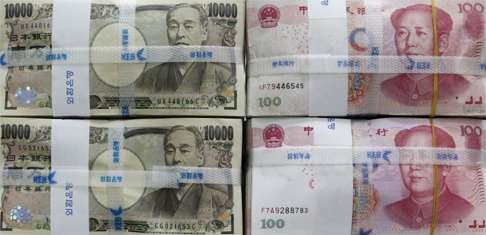
China stocks and yuan volatile as risk aversion prevails ahead of Brexit, MSCI decisions
Chinese stocks and the yuan exchange rate both had a bumpy ride in the first trading days of this week, as risk aversion gripped the markets due to a slew of uncertainties, in particular the MSCI’s announcement on A share inclusion due overnight.
Brokers said other uncertainties include a possible departure of Britain from the European Union after the June 23 referendum, as well as policy decisions by the US and other major central banks at meetings slated for later this week.
In equity markets, mainland China’s Shanghai Composite Index opened lower on Tuesday and swung between small gains and losses for most of the session. It closed slightly higher by 0.3 per cent or 9.12 points at 2,842.19. Nevertheless, the index failed to recoup heavy losses from Monday, when it plunged 3.2 per cent to post its biggest daily fall since February 25. In the first two days of this week, the Shanghai Composite Index slid 2.9 per cent.
“Investors are nervous as they wait for the other shoe to drop on Wednesday, when MSCI will announce its decision on the inclusion of A-shares,” said Xie Cheng, an analyst for Huatai Securities.
“If it were to be included, we would feel a bit more confident about A shares though it isn’t likely to bring in a huge capital inflow,” added Shen Ye, a Shanghai-based hedge fund manager. “If the MSCI opts not to accept A shares this time, a slide in the market can be expected.”
Looking ahead, Cheng isn’t optimistic about the A-share markets in the near term.
While there are no expectations for action from the Fed and the BoJ, their post-decision comments will still matter
“Even if A-shares were included, market volatility will still increase, as there are still a number of risks and uncertainties out there, including the Brexit and potential interest rate hikes by the US Federal Reserve later in the year,” he said.
Brexit refers to Britain’s decision on whether to keep its membership of the European trading bloc. Recent polls have suggested the vote is swinging toward a Brexit, unsettling investors across the globe.
Analysts said investors also look ahead to the US Federal Reserve’s two-day policy meeting due to conclude on Wednesday US Eastern time, after which Fed chairwoman Janet Yellen will hold a press conference. The Bank of Japan (BoJ) will also meet Wednesday for a two-day meeting.
“While there are no expectations for action from the Fed and the BoJ, their post-decision comments will still matter. In particular, the Fed’s economic projections will be scrutinised,” said Bernard Aw, an analyst for IG Group.
Besides these uncertainties, worries about the health of the Chinese economy also weighed on investor sentiment on Tuesday when David Lipton, the International Monetary Fund’s first deputy managing director, warned that China’s corporate debt is “high and rising fast” and the problem should be addressed to avoid “serious problems”.

Hong Kong stocks were also volatile. The Hang Seng Index on Tuesday dropped 0.6 per cent or 125.46 points to close at 20,387.53, adding to a 2.5 per cent decline on Monday. The index has tumbled 3.1 per cent so far this week.
In the currency markets, offshore yuan weakened against the US dollar to trade at 6.6037 as of 7pm Tuesday, down 0.11 per cent from the previous close. The currency fell the most in a month on Monday, approaching a five-year low, according to data from Bloomberg.
Global growth fears and Brexit concerns have rattled financial markets in the past few days, with investors fleeing riskier assets like equities and piling into safe-havens, such as the Japanese yen and gold.
In Asian trade on Tuesday, the yen surged to its highest level against the euro in more than three years. Gold futures for August delivery slightly retreated, after settling at their highest level in five weeks on Monday night on safe-asset buying.
In the meantime, the British pound fell 1.1 per cent to 149.98 yen as of 7pm Tuesday. The currency touched 149.48 yen on Monday, the lowest level since August 2013.
With additional reporting from Ren Wei


